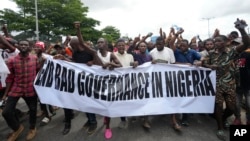Police in Nigeria say at least five people were killed when nationwide economic protests turned violent in some major cities Thursday, while the rights group Amnesty International says 13 protesters were killed by security personnel.
In a statement posted to the social media platform X, Nigeria’s inspector-general of police, Kayode Egbetokun, said “hoodlums” instigated a “mass uprising” under the guise of protest in several major cities, looting and destroying businesses as well as government buildings, including police stations.
Egbetokun said there was destruction in the cities of Kano, Borno, Yobe, Kaduna, Gombe, Bauchi, Abuja, Niger, and Jigawa. He said there were unprovoked attacks on security personnel in Kaduna, Kano and Gombe, and said one police officer was killed, although he did not provide details.
The inspector-general also said a bomb went off in a crowd of protesters in Borno on Thursday, killing four and injuring at least 34 others.
He said all units of the Nigerian police force have been put on alert and said they would get assistance from the military “if the need arises.”
The Associated Press, citing Nigerian police, said more than 300 people were arrested Thursday.
In a post to its X account late Thursday, Amnesty International Nigeria said security personnel fired live ammunition at peaceful protesters during demonstrations, killing six people in Suleja Niger state, four people in the Borno state’s capital, Maiduguri, and three in Kaduna.
Thousands had taken to the streets in Nigerian cities in anti-government demonstrations against economic hardships as well as longstanding systemic issues such as corruption and press freedom. Organizers said they were inspired by recent anti-government protests in Kenya that forced that country’s president to cancel proposed tax increases and dissolve his cabinet.
The protests are intended to go on for 10 days, and there were reports of continued protests in several cities Friday.
Police used tear gas Thursday to disperse crowds in the capital, Abuja, and in the nation’s second-largest city, Kano, where demonstrators attempted to start fires outside government buildings.
Amid a heavy security presence in the commercial capital, Lagos, protesters marched toward government buildings, ringing bells, chanting and carrying placards denouncing corruption and Nigeria’s green and white flag. They were led down the street by armed security personnel.
Many Nigerians blame the cost-of-living crisis on reforms introduced last year by President Bola Tinubu, who canceled a popular fuel subsidy and took steps that devalued the naira.
Ahead of the protests, lawmakers in the national assembly last week voted to more than double the monthly minimum wage of federal workers from 30,000 naira to 70,000 naira, about $43. The president signed the bill into law earlier this week, but it appeared to do little to dampen calls for a nationwide demonstration.
Religious leaders and other social groups tried to discourage the protests out of fear that, like the Kenya protests, they could turn violent. International group Human Rights Watch warned that Nigerian government rhetoric ahead of the protests raised fears of a violent crackdown.
Last week, Inspector-General Egbetokun warned, "Some groups of people, self-appointed crusaders and influencers, have been strategizing and mobilizing potential protesters to unleash terror in the land under the guise of replicating the recent Kenya protests. ... We must ensure that these protests do not snowball into violence or disorder.”
Some information for this report was provided by The Associated Press, Reuters and Agence France-Presse.





